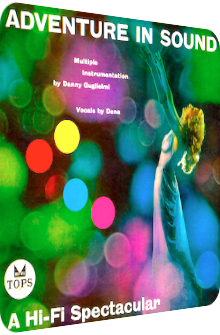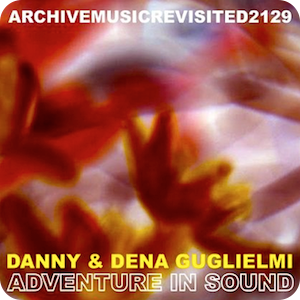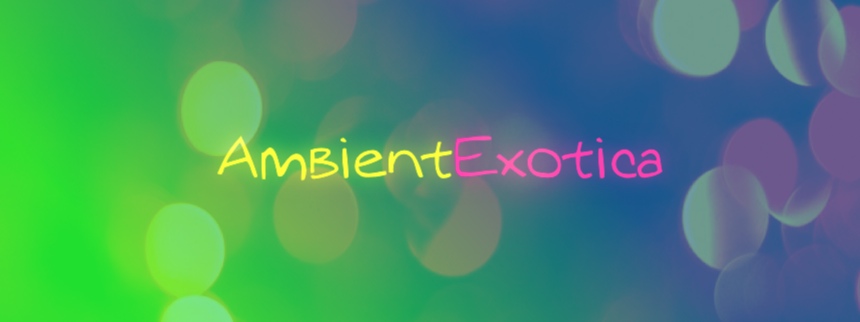
Danny & Dena Guglielmi
Adventure In Sound
1956
The San Fernando-based couple of arranger and singer Danny & Dena Guglielmi is best known – if at all – for two particular achievements in their careers. Firstly for envisioning the faux-orchestral Space-Age album Adventure In Sound, released in 1956 on the budget label Tops Records, that comprises of multi-dubbed layers, tones and instruments which are altogether played by Danny Guglielmi and then carefully laid upon each other in a mind-bending and meticulously dedicated, albeit tiresome work phase. And secondly for receiving a thank you note from the Eisenhower administration which arrived at the Guglielmis' door in order to acknowledge Danny’s get-well wishes in the shape of the soothing music he sent the President after the big man recovered from a heart attack; SpaceAgePop carves out further details in a highly enlightening article.
Adventure In Sound is a 14-track LP spanning classics of the North American Jazz Book as well as five unique songs from the feather of Dena’s husband, with her singing the lyrics on the majority of interpretations. Despite their successful careers – Danny served as an arranger for Frank Sinatra, Buddy Clark and MGM Studios among others, while Dena, a native of Kansas City, Missouri, dubbed many actresses in Hollywood movies who could not sing as good as the director demanded –, Adventure In Sound is perceived as an oddity both by contemporary listeners and the press alike, despite its striking achievements of simultaneous instrumental or vocal layers long before the Jamaican Dub craze started around 1968, and naturally long before DJ-targeting software, tools and apps even began to materialize. The result is neither messy nor convoluted, but surprisingly coherent and accessible, with the typical Space-Age dreaminess and wonkiness only being applied in smaller doses. Danny’s skill on the bass, piano, flute and violin is enthralling, with Dena’s vocals being luring and silken. Here’s a closer look at one Space-Age work that is not necessarily deemed essential, but features crafty renditions and shiny dreamscapes.
 The zoetrope stock photo of the 2012 digital reissue does the arrangements justice.
The zoetrope stock photo of the 2012 digital reissue does the arrangements justice.
It’s So Peaceful In The Country by Alec Wilder is a splendid way to start a Space-Age album, for its mellow big band washes can be turned into something much more cosmic. Danny and Dena Guglielmi’s effort starts perfectly in this regard, with a field recording of a nocturnal scenery sporting crickets and birds. Once aqueous-spacey strings cross-fade into the scenery and underline Dena’s deep voice, the enchantment only grows. Instead of bolstering the arrangement, it is wonderfully reduced and placid, with Danny’s violin and guitar aortas serving the purpose of letting his wife’s vocals shine all the more.
Ray Noble’s Cherokee is a contrapuntal tune in that it is a take on the instrumental, with Prohibition era bass coils, effervescently murky violin twangs that even mimic a singalong baritone voice (!) and a lively physiognomy overall. While I Don’t Stand A Ghost Of A Chance With You by Duke Ellington is presented here akin to the opener in a more laid-back lascivious-dreamy arrangement with warped space licks on the violins, rhythm guitars and Dena’s enthralling alto range, Pat Boone’s Jealous is an eminently pointillistic fleeting visit to Hapa Haole lands with paradisiac ukulele glints and amicable violins. The partial quirkiness of the sun-soaked ukulele clashes with the Space-Age scene, but this makes the take so splendid.
A-E-I-O-U by Norma Roberts then returns to Prohibition times once again with silkened and decidedly blurred violin cascades, strikingly archetypical Hoboken bass runlets as well as Dena’s unsurprisingly vocal-heavy but delightfully jocular performance. Hoagy Carmichael’s and Stuart Gorrell’s adjacent Georgia On My Mind is a particularly successful instrumental take in that its lachrymose and prolonged structure is ameliorated by a gorgeously galactic glissando on the stacked violin layers which seem more colorful and adventurous than the oft-interpreted classic might let you think. There is a kind of darkness surrounding the scenery, but the downright glowing luminosity of the strings lessens the impetus and creates a phantasmagoric aura of rapture. Side A closes with Danny Guglielmi’s first unique tune, with many more to follow on side B: Na-Wa-Da-Ha features a spiraling violin shrapnel of the rose-tinted kind, with a few pentatonic tones thrown in to boost the Asian feeling a little bit. Dena’s vocals are ennobled by her own susurrant backing voice and round off this first side in a languorous fashion. One of the best takes.
The much spacier side B kicks off with a huge Space-Age take on Don Raye’s, Gene DePaul’s and Patricia Johnston’s I’ll Remember April. The benign acoustic guitar aorta is nothing new, but the delicately vitreous clangs and coruscations are a frilly addition whose aeriform flecks are the signature element of this string-heavy piece and never too annoying to not enjoy them severely. “The fire will dwindle into glow and ashes” indeed, but not for long! The following Mosquito Festival is a Guglielmi original and shows his skills as a sound engineer yet again via a particularly ebullient and peculiar mélange of whirling violins akin to Martin Denny’s later and infamous Tse Tse Fly off Afro-Desia (1959) and bursts of more euphonious blebs. A nerve-racking but good-spirited critter.
Edward Heyman’s and Johnny Green’s Out Of Nowhere surprises with textures that are actually not mentioned in the liner notes. There seems to be a Hammond organ hidden in-between the string washes and lead fiddle parts, but these phantom frequencies could well be perfectly string-based and only share the textural base. Notwithstanding this unique instance, the ballad has yet another particularity surprise in store, and that is Dena’s doubled vocals. The effect is only rarely applied, but in the year 1956, i.e. in the pre-Dub years spawned in Jamaica, this was as crazy an innovation as can be.
Three unique Guglielmi tracks follow in a row: while Bullfrog resembles the nature of this brute via an onomatopoeic violin and enmeshes it with a swampy acoustic guitar placenta, Firelight Reverie is a magnificently hypnotic Space-Age mystery par excellence with tranquilizing vocals by Dena, enigmatic tremolo strings and an ashen aura overall, with Hot Scottisch (sic!) being the final piece of the embedded triptych and the second stop to sun-dappled Polynesia with the brightest of all ukulele vesicles and buzzing backing violins. This is mostly Hapa Haole except for the middle segue which ventures into loungey Jazz lands. Ted Snyder’s The Sheik Of Araby is the final part of the mosaic and resembles that mentioned middle segue, but revs the tempo up. No Oriental mood is acknowledgeable whatsoever in this Jazz standard, but the galactosamine-fueled violin as well as the humming faux-choir with its rising tones let the album come full circle.
Now admittedly, Adventure In Sound is too bold a title when viewed from today's angle, but what appears rather bland and less cutting-edge today was potentially mind-blowing to the contemporary followers of Danny and Dena Guglielmi. The album itself was never considered a masterpiece by anyone, neither by the press nor the bachelor pad-inhabiting nerds, but the interesting recording technique does meet equally successful aesthetics. While there is only one field recording gracing the album (in the opener) and though there is anything particularly exotic on this album but the two Hapa Haole instances called Jealous and Hot Scottisch, the LP does nonetheless cater to certain needs of the adjacent Space-Age aficionados. Danny Guglielmi creates a rather big orchestra with his dubbing and multi-tape extravaganza, and even though he cannot mimic the wideness and vigor of truthful orchestras with at least 20+ players, he manages to keep everything in sync. Add the designedly quirky tonality to the setting which appears time and again, and Adventure In Sound becomes a rather accessible, not too alienating artifact from space, made by humans on Earth.
Highlights include the nocturnal launch It’s So Peaceful In The Country, the stardust symphony that is Georgia On My Mind, the spiteful cheekiness of Mosquito Festival and the magnificent mystique of Firelight Reverie with its firefly-like colors. The aesthetics-related question remains whether this album is really necessary in hindsight, for there are many other truthfully orchestral Space-Age works to choose from. I would agree, even strongly so, but there is a certain magic in these arrangements, and given the fact how hard it must have been to piece them together in such a stringent, coherent way, Danny and Dena Guglielmi have created a real UFO here: one that remains under the radar, but consists of technologically advanced structures. The warmth is never amiss, and that makes it a fitting piece in every Space-Age fan’s collection. Available on vinyl and a download version remastered by Sinetone AMR in 2012.
Further reading:
As is always the case, SpaceAgePop.com is the site to go for all things Space-Age. It has a terrific entry about the Guglielmis in store and goes into more detail about both the Eisenhower incident and the couple’s discography than any other web-based resource.
Exotica Review 265: Danny & Dena Guglielmi – Adventure In Sound (1956). Originally published on Sep. 28, 2013 at AmbientExotica.com.
